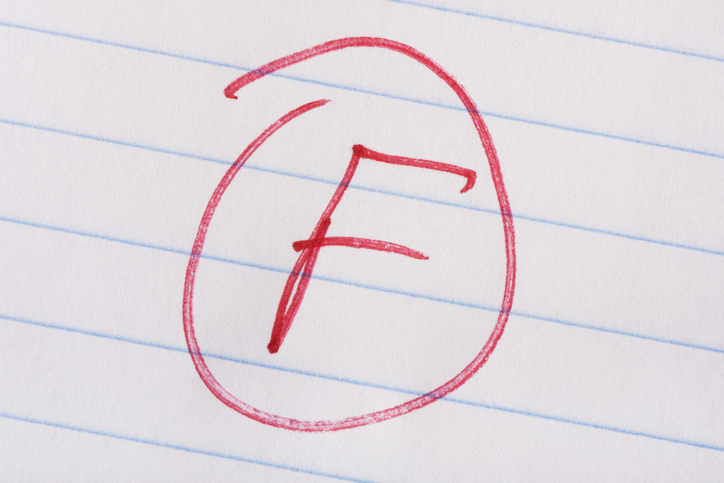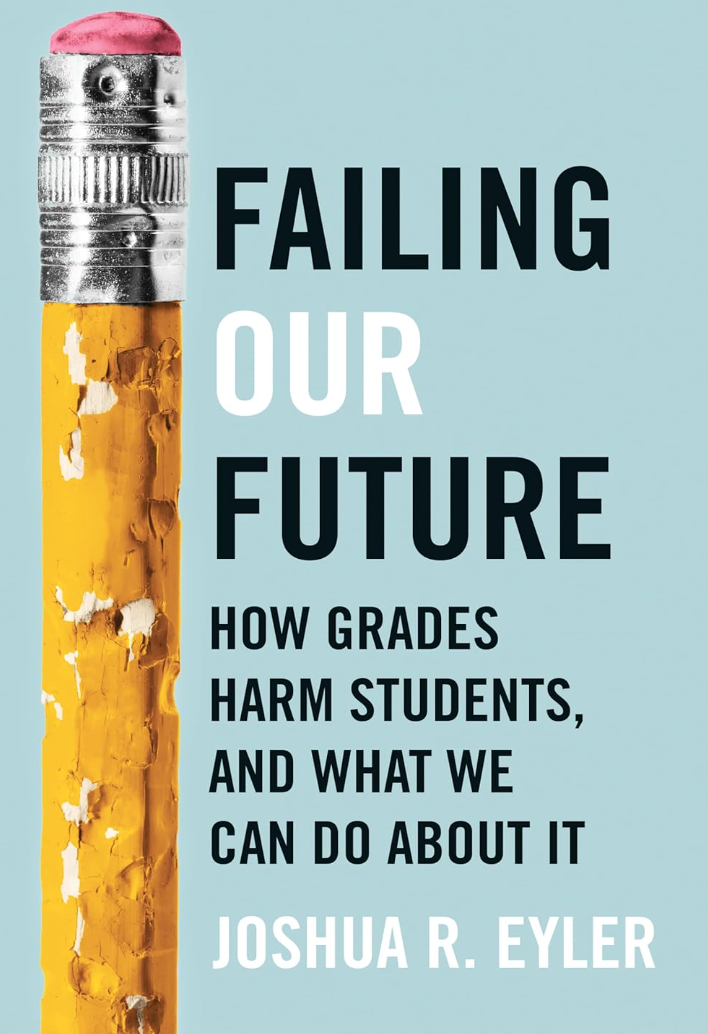A New Book Argues Grades Are Failing Students. Here’s Why
Joshua R. Eyler gives the U.S. grading system an “F” in his new book, "Failing Our Future: How Grades Harm Students, And What We Can Do About It."

Joshua R. Eyler gives the U.S. grading system an “F” in his new book Failing Our Future: How Grades Harm Students, And What We Can Do About It. In it, which publishes on August 27, Eyler makes the case that grades hurt academic success and are helping to fuel the ongoing youth mental health crisis.
Eyler is director of the Center for Excellence in Teaching & Learning and an education professor at the University of Mississippi. I recently spoke with him about how he came to these conclusions and the alternative grading systems he’s studied that thousands of schools are already using.
Is It True Grades Aren’t Linked To Academic Success?

One of the main arguments in favor of grading is that it inspires students to do work, and without it, students wouldn’t have any motivation.
The research doesn’t really support this claim, Eyler says. In his book, he points to a 2021 meta-analysis of many previous studies looking at the impact of grading overall. The study compared three groups of students, one who received grades, a second group that received feedback but no grades, and a third group that received no grades or feedback. The study’s authors note: “Overall results indicated that grades positively influenced achievement but negatively influenced motivation compared to no feedback.”
Perhaps more significantly, students who received comments without grades saw increased achievement and motivation. “Compared to those who received comments, students receiving grades had poorer achievement and less optimal motivation,” the study’s authors conclude.
And this research is not an outlier. “That work really confirms research that has been around for decades showing the [negative] effect of grades on performance learning and motivation,” Eyler says. “It’s a continuous thread that we see through these investigations.”
Why Do Grades Seem To Decrease Achievement?

Education scientists often talk about intrinsic vs. extrinsic motivation. Grades, most agree, are extrinsic motivators. “They're the prize, the candy, the reward that students get for following the rules and moving through the system,” Eyler says. “What we know about extrinsic motivators is that they are good for compliance. They work to get people to do things that they don't want to do. And so, yes, they can work to get students in seats, to get them to turn things in on time, to get them to participate.”
Tools and ideas to transform education. Sign up below.
However, there’s a catch. “An extrinsic motivator can never guarantee that someone will learn just because they're forced to be in a classroom,” Eyler says. “Learning depends on intrinsic motivation which grades affect pretty negatively.”
Additionally, grades can often interfere with fundamental patterns of learning. “The natural way that we learn something from a scientific perspective is we try things out. We make a mistake. We get feedback on that, and then we try it again,” Eyler says. “This is a cycle that our brains are really built to go through as we learn new things and grades arrest that process before it can ever take place. So we get to the trying things out part, and then we get a stamp of how well we tried them out without the opportunity to benefit from the feedback and the trying again.”
Beyond academics, grades are consistently linked to stress and negative mental health in students, Eyler says.
But Isn't Doing Away With Grades Impossible?
Grades seem so engrained in our education system that even talking about a school without grades feels radical. But there are many that exist. More than 3,000 Montessori schools, including 500 public schools, are gradeless. Beyond these, many K-12 districts and colleges across the U.S. have embraced nontraditional grading systems, Eyler says.
“There are definitely some great models and examples of schools that don't have any grades, both at the K-12 and college level,” Eyler says. But he’s not advocating schools across the country pump the breaks on all grading. “I think a lot of this conversation is really trying to get from the traditional grading schemes that we're in now to reorienting students' relationship with grades by trying out some of the alternative grading models that people are using.”
Many school districts are moving toward standards-based grading, which is also referred to as competency or proficiency mastery grading. Other grading methods include portfolio grading, collaborative grading, and specifications grading.
“There’s lots of different ways people are experimenting with the kinds of evaluation that they’re using to release the pressure valve and put the emphasis back onto learning and less about the grade itself,” Eyler says.
What Role Can Technology Play In This Conversation?
Technology isn’t needed to move from traditional grading to another grading method but it can make it easier by allowing teachers to create multiple opportunities for success through their LMS or other tools.
Elyer points to a colleague at the University of Mississippi who offers an unlimited retake system on chemistry classes. To do this the professor created a vast dataset of questions. “She has all the possible problems in the LMS and it generates new exams kind of randomly pulling from that databank. So it saves time. It helps to automate the process,” he says.
Additionally, new software is being developed to translate mastery-grade transcripts into their traditional grade equivalents. Eyler says these later tools may be helpful but aren’t necessary because colleges can already evaluate non-traditional transcripts.
What Are The Biggest Grading Misconceptions?
Many proponents of traditional grades say that without grades there is no way to tell if students have learned, but that’s not true, Eyler says. “There's nothing inherent to a grade that is intrinsically connected to whether or not a student is learning something. We can give students that information through written or oral feedback just as easily as we can, in fact, better than we can, just by putting a 92 or a B- on something.”
He adds this idea is tied to another common misconception that grades are necessary to maintain rigor and academic standards. “That's not true, either, for many of the same reasons,” he says.
Erik Ofgang is a Tech & Learning contributor. A journalist, author and educator, his work has appeared in The New York Times, the Washington Post, the Smithsonian, The Atlantic, and Associated Press. He currently teaches at Western Connecticut State University’s MFA program. While a staff writer at Connecticut Magazine he won a Society of Professional Journalism Award for his education reporting. He is interested in how humans learn and how technology can make that more effective.

